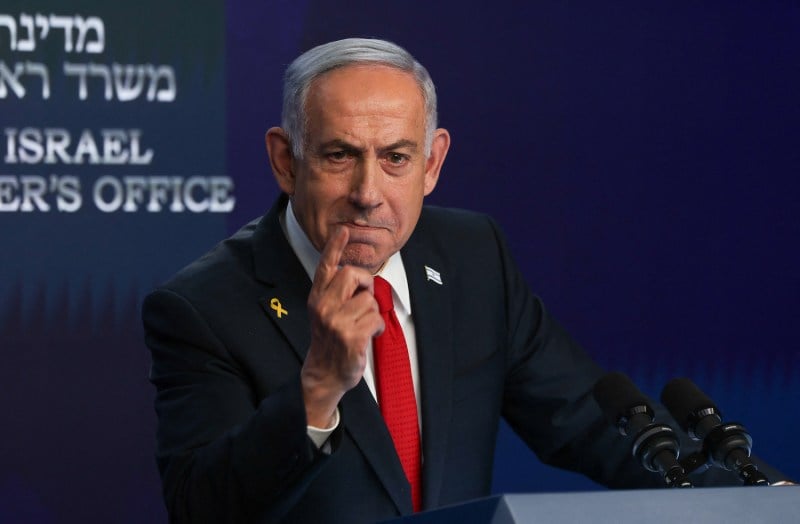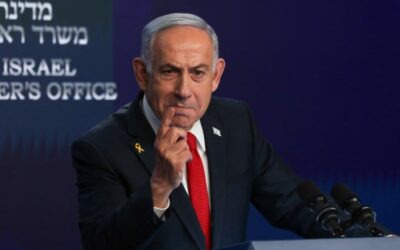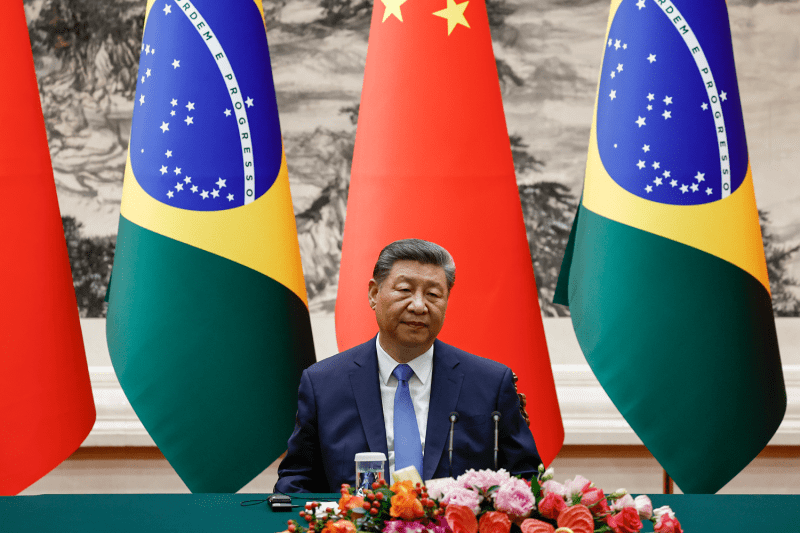Netanyahu Is Backed Into a Corner on Gaza

Netanyahu Is Backed Into a Corner on Gaza
The Israeli leader is facing growing pressure, even from Trump, over his prosecution of the Gaza war.
Israeli Prime Minister Benjamin Netanyahu gives a press conference in Jerusalem on May 21. Ronen Zvulun/AFP via Getty Images
Welcome back to Foreign Policy’s Situation Report, where, among other storylines, we’re watching what appears to be a quiet but quick sidelining of Elon Musk by U.S. President Donald Trump and his administration. More on that from Rishi here.
Here’s what’s on tap for the day: Israeli Prime Minister Benjamin Netanyahu faces growing pressure over the humanitarian crisis in Gaza, drone warfare between Ukraine and Russia sharply escalates, and Iran nuclear deal negotiations hit a snag.
Welcome back to Foreign Policy’s Situation Report, where, among other storylines, we’re watching what appears to be a quiet but quick sidelining of Elon Musk by U.S. President Donald Trump and his administration. More on that from Rishi here.
Here’s what’s on tap for the day: Israeli Prime Minister Benjamin Netanyahu faces growing pressure over the humanitarian crisis in Gaza, drone warfare between Ukraine and Russia sharply escalates, and Iran nuclear deal negotiations hit a snag.
Under Pressure
As the Israeli military escalates ground operations in Gaza, Netanyahu is facing rising domestic and international pressure to shift course amid a worsening humanitarian crisis there.
In a sign that he’s beginning to feel the heat, Netanyahu on May 18 announced that Israel would partially end its nearly three-month blockade on aid into Gaza. The blockade, which sparked concerns of famine, was condemned worldwide. Netanyahu said his decision came after warnings from allies, including U.S. senators, who told him “images of mass famine” would jeopardize support for Israel.
Even Trump, whose 2024 election victory was seen as a win for Netanyahu, has in recent days raised alarm about Palestinians starving. Trump officials have also been critical of the humanitarian situation in Gaza, warning that it’s undermining Israel’s standing.
On different pages. The U.S. president did not make a stop in Israel during his trip to the Middle East last week. And although Israel denied that Trump was snubbing Netanyahu, this came amid questions over whether the Trump administration has been bypassing the Israeli leader on various issues.
Trump 2.0 has still been very supportive of Israel—but not to the extent that Netanyahu appeared to expect based on their history. At a time when Netanyahu says Israel is deploying a “massive force to take control of all of the Gaza Strip,” the White House this week said Trump has “made it very clear” that he wants the war to end.
The leaders of France, the United Kingdom, and Canada also issued fierce criticism of the Israeli government this week. They described the situation in Gaza as “intolerable” and threatened to take “concrete actions” if Israel didn’t “cease the renewed military offensive and lift its restrictions on humanitarian aid.”
Though Israel’s traditional allies are growing impatient with its actions in the war, they were also quick to condemn the killings of two Israeli Embassy staffers—Yaron Lischinsky and Sarah Milgrim—in Washington on Wednesday. The suspect in the shooting, which occurred outside the Capital Jewish Museum, reportedly shouted “Free Palestine” as he was being arrested.
Netanyahu and far-right ministers in his government blamed the killings on critics of the war in Gaza, including opposition politician Yair Golan, who recently warned that Israel was at risk of becoming a “pariah state” because of its actions in the conflict.
Golan, a former general, said, “A sane country does not wage war against civilians, does not kill babies as a pastime, and does not engage in mass population displacement.”
Criticism at home. Though Golan’s provocative words sparked outrage among politicians in Netanyahu’s coalition, former Israeli Prime Minister Ehud Olmert said Golan’s comments reflect “what many people think.”
Recent polling has shown that a strong majority of Israelis (about 70 percent) would support ending the war if the remaining 58 hostages held by Hamas, of whom 20 are thought to still be alive, were released. Hostage family members, who are among Netanyahu’s biggest critics, have also expressed opposition to continuing the war.
Yotam Cohen, the brother of Nimrod Cohen, an Israel Defense Forces (IDF) soldier who was captured by Hamas on Oct. 7, 2023, and is believed to still be alive, told SitRep that the “vast majority” of Israelis “want the hostages to be released and brought back even in the price of ending the war.”
Cohen said the Israeli government is ignoring the will of the people. “Ending the war would be the right thing to do for the hostages, for us as hostage families, and for the entirety of the people of Israel,” Cohen said.
Critics of the war have contended that Netanyahu—who is on trial for corruption—is only continuing it for political reasons, as far-right members of his fragile coalition have threatened to collapse the government if Netanyahu ends the fighting.
“It’s unfortunate that the prime minister and his coalition partners are not listening to what the people of Israel have been wanting,” Ruby Chen, the father of American Israeli IDF soldier and hostage Itay Chen, who is believed to have been killed on Oct. 7, 2023, told SitRep on Monday.
As the longest-serving prime minister in Israel’s history, Netanyahu has exhibited a remarkable ability for political survival throughout his career. Though the Israeli leader finds himself in an increasingly precarious position, it’s far too early to make predictions on Netanyahu’s political future. And despite growing opposition to his prosecution of the Gaza war, Netanyahu doesn’t seem to be fully backing down and on Thursday said Trump still supports his objectives.
On the Button
What should be high on your radar, if it isn’t already.
Drone strikes. Russia’s defense ministry on Thursday said it had shot down 485 drones launched by Ukraine this week, including 63 over its capital region. Meanwhile, Russia launched 128 drones at Ukraine on Thursday, damaging residential buildings in the Dnipro and Kharkiv regions. In Kyiv, falling debris from intercepted drones landed in a schoolyard, the New York Times reported.
The war between the two countries has intensified following an inconclusive two-hour phone call between Trump and Russian President Vladimir Putin on Monday that failed to produce meaningful progress towards a ceasefire.
Ukrainian President Volodymyr Zelensky posted on X on Wednesday that he had spoken with NATO Secretary-General Mark Rutte and that the two discussed possible “sanctions that can have a real impact on Russia” as well as “continuing negotiations with the Russian side regarding a ceasefire.”
Trump’s Golden Dome. Trump on Tuesday unveiled plans to develop his oft-touted “Golden Dome” missile defense shield for the United States, which he said would “protect our homeland from the threat of foreign missile attack.”
Trump said the system, modeled after Israel’s Iron Dome, is expected to be operational within three years, adding that Canada had expressed interest in being covered by the system as well. Trump’s budget bill passed by the House on Thursday includes $25 billion to build the Golden Dome, but Trump said the total cost is expected to eventually rise to $175 billion.
It’s also not a new concept, having originally been proposed by President Ronald Reagan back in the 1980s.
Snapshot
Donald Trump Jr. speaks during a session on “Investing in America” at the Qatar Economic Forum in Doha on May 21, days after his father, U.S. President Donald Trump, visited the country and signed deals worth $1.2 trillion. The session was previously titled “Monetizing MAGA: Investing in Trump’s America” but was later changed with no explanation.Karim Jaafar/AFP via Getty Images
Hot Mic
Negotiations over Iran’s nuclear program appear to be on shaky ground amid disagreements over uranium enrichment, with the Trump administration saying it won’t agree to a deal that allows Iran to continue enriching uranium and Iran’s leaders insisting that the country has the right to do so for civilian purposes.
With Iran and the United States set to hold a fifth round of nuclear talks in Rome on Friday, SitRep on Tuesday caught up with former Deputy Secretary of State Wendy Sherman, who served as lead negotiator for the Obama administration on the 2015 nuclear deal with Iran, for her take on the state of the negotiations.
Sherman expressed concern over “whether the administration is ready to do the very hard work to even get a framework for a deal or whether the administration—as it is doing in the Russia-Ukraine situation—is preparing to back off and let others take whatever action they desire.”
That said, given the political support Trump has in the United States and Iran’s relatively weakened position compared with 2015, Sherman said it’s “possible to reach a short-term agreement in a fairly swift period of time and then lay the grounds for a final agreement.”
However, she cautioned that “this takes hard work” and “takes constancy that we’ve seen ease up of late, in part because [Trump envoy] Steve Witkoff has been tasked with doing three major negotiations simultaneously, which is pretty tough to do.”
Put On Your Radar
Monday, May 26: Nicusor Dan is sworn in as Romania’s president after an election saga in which he narrowly beat his far-right opponent.
Canada’s Parliament holds its first session since the election of Prime Minister Mark Carney.
Malaysia hosts the 46th summit of the Association of Southeast Asian Nations.
Wednesday, May 28: U.S. Vice President J.D. Vance speaks at the Bitcoin 2025 conference in Las Vegas.
Friday, May 30: The IISS Shangri-La Dialogue, one of the top annual gatherings of world leaders and defense officials, kicks off in Singapore.
By the Numbers
$43—the cost of a dozen eggs in Gaza, according to interviews with local residents by Time magazine. That’s an increase of $40 since Israel restarted its post-cease-fire military offensive against the territory on March 18.
Quote of the Week
“I’m sorry I don’t have a plane to give you.”
—South African President Cyril Ramaphosa, providing a moment of levity in an otherwise uncomfortable Oval Office meeting in which Trump reiterated baseless claims of white genocide in South Africa. Ramaphosa said that in response to a reporter’s question to Trump about Qatar gifting a $400 million jet for him to use as Air Force One, which the Defense Department formally accepted on Wednesday.
FP’s Most Read This Week
- Russia Has Started Losing the War in Ukraine by Michael Kimmage
- Another Clash Over Kashmir Is Coming by C. Christine Fair
- A Russia-NATO War Would Look Nothing Like Ukraine by Fabian Hoffman
Whiskey Tango Foxtrot
They may have signed a free trade agreement recently, but the United Kingdom and the United States (still) cannot agree on tea, as the British Embassy in Washington reminded everyone on International Tea Day on Wednesday. The areas of disagreement are numerous, though this year the embassy focused its ire at the concept of iced tea, also apparently known as “cold, sugared betrayal.”
John Haltiwanger is a reporter at Foreign Policy. Bluesky: @jchaltiwanger.bsky.social X: @jchaltiwanger
Rishi Iyengar is a reporter at Foreign Policy. Bluesky: @iyengarish.bsky.social X: @Iyengarish Instagram: @iyengar.rishi
Stories Readers Liked
In Case You Missed It
A selection of paywall-free articles

Four Explanatory Models for Trump’s Chaos
It’s clear that the second Trump administration is aiming for change—not inertia—in U.S. foreign policy.





















Join the Conversation
Commenting is a benefit of a Foreign Policy subscription.
Subscribe
Subscribe
Already a subscriber?
.
View Comments
Join the Conversation
Join the conversation on this and other recent Foreign Policy articles when you subscribe now.
Subscribe
Subscribe
Not your account?
View Comments
Join the Conversation
Please follow our comment guidelines, stay on topic, and be civil, courteous, and respectful of others’ beliefs.
View Comments
Change your username |
Log out
Change your username:
CANCEL
Confirm your username to get started.
The default username below has been generated using the first name and last initial on your FP subscriber account. Usernames may be updated at any time and must not contain inappropriate or offensive language.